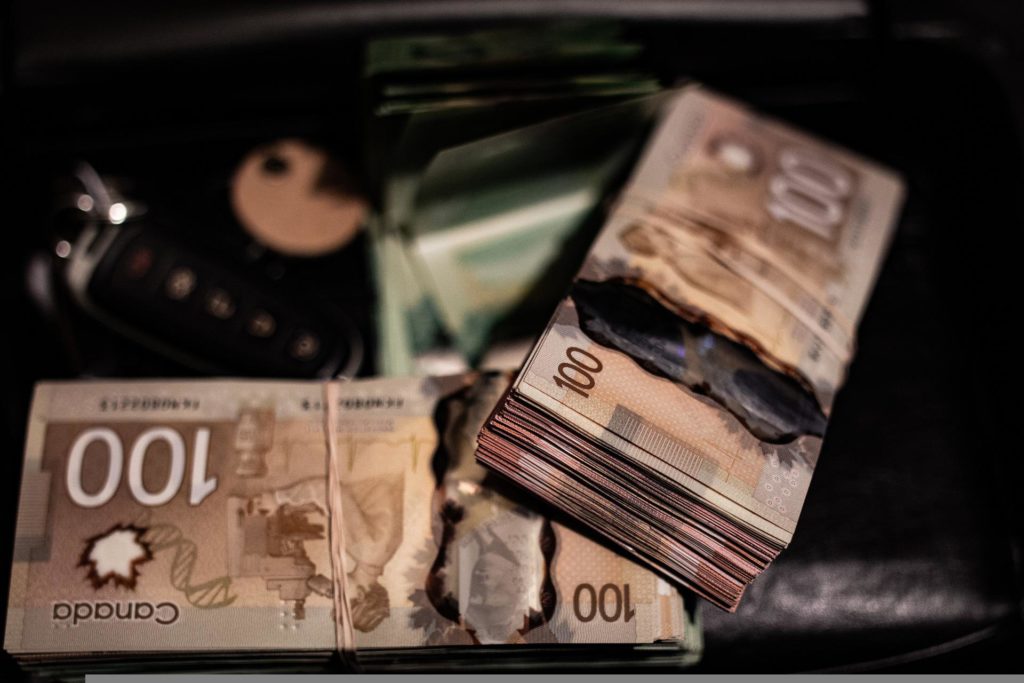
Of all the programming elements in radio – music, news, personality, traffic, weather, and even commercials – there’s one that is perhaps the least understood:
Contests
They’ve been around since the old quiz shows, most of which are different versions of trivia games. But as we know from the recent Wordle craze, there’s always an opportunity for an exciting contest or game to become a phenomenon. Back in the day, radio listeners have enjoyed playing along with quizzes or trying incessantly to be the correct caller.
Some contests are bigger than life. Car giveaways have long been popular, but back in the 80’s, a number of stations gave away the American dream – a brand new home. Gas giveaways are always popular when prices at the pump go crazy – like they are right now.
And then there was “The Last Contest,” a brilliantly produced sendup of radio giveaways, designed to outdo every major contest that came before it. Designed and produced by the legendary Jack McCoy, it lit up the phones, the audience, and radio with its bigger than life prizes and production. I’m sure Art Vuolo has the entire package somewhere on file.
Most people who grew up listening to the radio recall at least one time where they dedicated a part of their lives to trying to win something from a local radio station – that pricey pair of concert tickets to a sold-out show, a new car, the ultimate garage, or that impossible to find Christmas toy. You may recall I wrote a blog about the new Chairman of the FCC, Jessica Rosenworcel, confessing her participation in radio giveaways back when she was was growing up in Hartford. Many of us have those memories.
And yet, despite the rich history of radio’s on-air contests, they almost never “test” in station research. You know that reality all too well if you’ve ever conducted perceptual research. Contests usually occupy the lower regions of the hierarchy of reasons why consumers say they listen to radio. We see this in Techsurvey every year in our “Why AM/FM radio?” question. Here’s the pecking order from this year’s survey, based on those who say each is a “main reason” why they listen to broadcast radio:
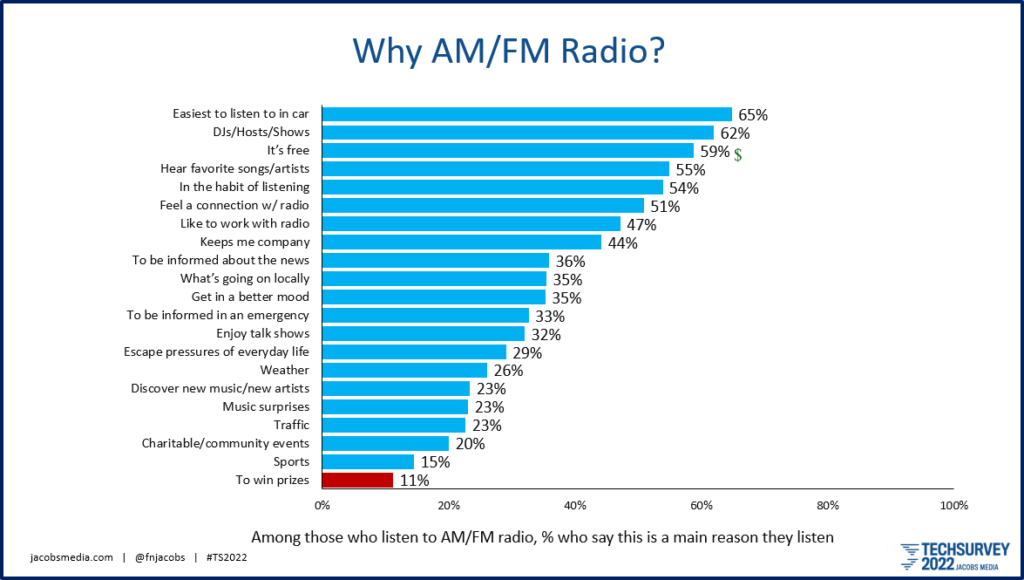
Radio has many wonderful qualities as this rank-ordered list of the medium’s attributes indicates. And out of 21 possible benefits, listening to radio stations “to win prizes” comes in dead last. In fact, just over one in ten of our core fans in Techsurvey 2022 tell us contests and giveaways are a main motivator to listen. This year’s study is no anomaly.
So, why do stations run contests at all, based on this data that helps explain why regular listeners tune in AM/FM radio stations?
Because they work.
First of all, had we asked whether these same 30,000+ respondents had ever participated in a radio contest, our percentage would be significantly higher. Still, why don’t giveaways test better in everybody’s research? For the vast majority of listeners, contests may not be a main driver why they feel compelled to tune in. But they’re a factor that can motivate listenership and participation, especially if contests capture the audience’s imagination and attention.
That means more than simply running “9th caller” contests, or even the ones where the audience has to text a code word. Don’t get me wrong. Those contests can be effective and even generate ratings. But they often lack a strategic benefit that goes hand in hand with their simple tactics. As former radio guru turned podcast maven, Steve Goldstein, used to call it, great contests are “tactegic” – that is, they combine a simple-to-understand methodology with a prize that reflects a radio’s station’s position or format.
a strategic benefit that goes hand in hand with their simple tactics. As former radio guru turned podcast maven, Steve Goldstein, used to call it, great contests are “tactegic” – that is, they combine a simple-to-understand methodology with a prize that reflects a radio’s station’s position or format.
A great case in point is a Classic Rock station giving away a classic car, like a vintage Corvette, T-Bird, or Mustang. The prize supports the station’s music position. And when the method of entry – say, giving away 99 keys, one of which starts the car – is simple, easy to understand, and seems possible to win, you just might have a contest that checks all the boxes.
“The Birthday Game,” popularized by Film House, worked for a number of these reasons. The station would read off birthdates several times a day (ex: May 23rd), and if that was your birthday, you called the station to win the money. The cash prize was always huge, typically in the thousands – often five figures – the odds seemed plausible (365 to 1, right?) And back in the 1980’s when the contest became ubiquitous in most large markets throughout the U.S., Film House required stations to support the contest with massive TV campaigns, usually featuring dollars bills raining from the sky in the air studio.
Another emotional element in “The Birthday Game” was intrigue. Whose birthday would the station read today? And could it be yours?
That leads us to mystery and suspense, another key factor that separates great radio contests from the also-rans. Do you remember the famous “Black Box” promotion?” A station encases an amazing prize in a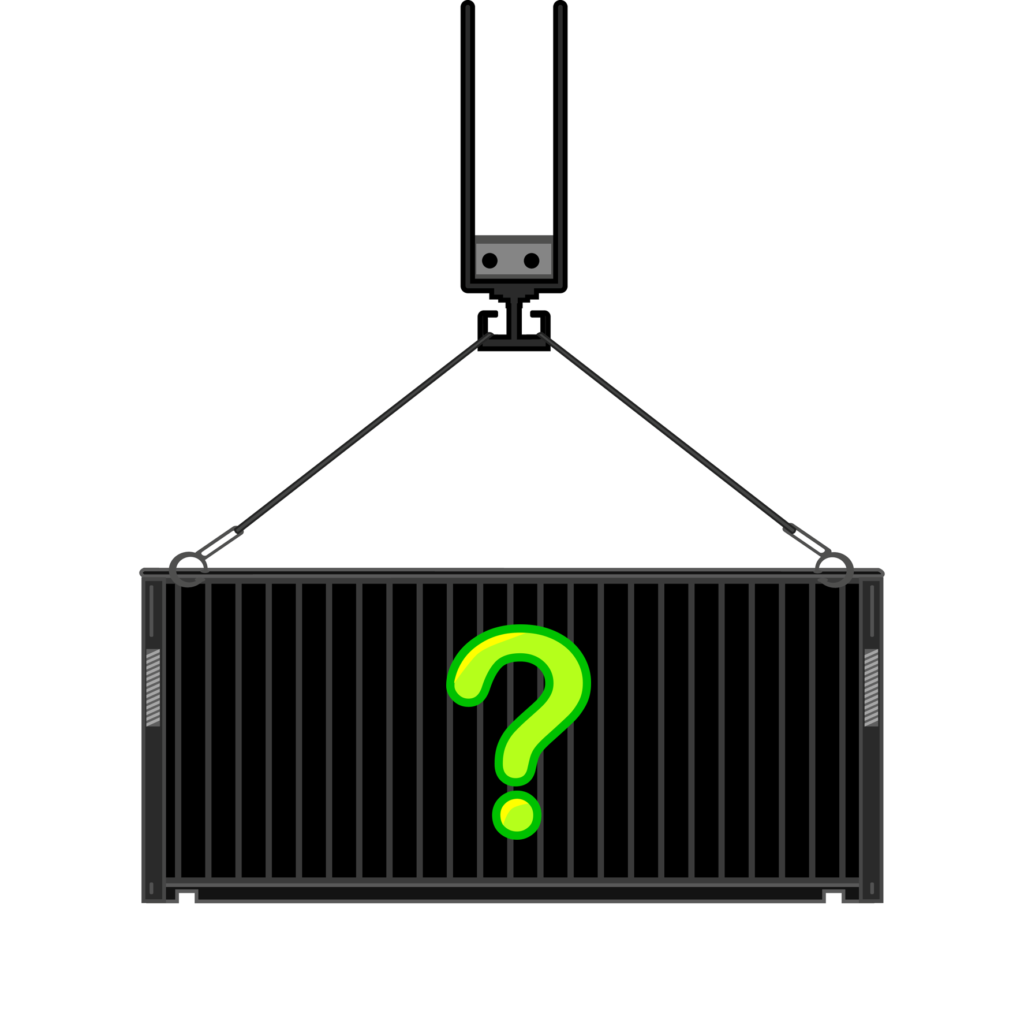 huge black box, usually suspended by a crane in a highly visible area of the metro. On the air, clues help players identify the contents. Most times, the box itself stirred up buzz, making for so-called “water cooler talk,” that is, when workers actually hung out together on job sites, offices, schools, and medical facilities.
huge black box, usually suspended by a crane in a highly visible area of the metro. On the air, clues help players identify the contents. Most times, the box itself stirred up buzz, making for so-called “water cooler talk,” that is, when workers actually hung out together on job sites, offices, schools, and medical facilities.
What’s in the box? Who put it there? Why is it hanging from that crane downtown? And what’s inside?
That’s why a recent phenomenon occurring in a small New Brunswick town in Canada has generated worldwide buzz and attention. The city in question is Miramichi, population just 17,600.
It turns out someone hid 13 $100 bills around town in 13 locations around town. The giveaway culminated – when else? – on Friday the 13th just a few days ago. But in its wake, the residents of Miramachi couldn’t stop talking about this mystery giveaway.
The story goes like this: a deep pocketed mystery man or woman named Roman Dungarvan is said to be making amends to the locals for the family’s “dark haunted past,” according to local lore. Hence, the money being mysteriously distributed around town. And there are also references to slasher films, like the “Friday the 13th” franchise.
Instead of clues given out on the airwaves of a local station, it’s happening on a Facebook group.
As we documented in Techsurvey 2022, these social media gathering spots are becoming more popular. In fact, six in ten respondents say they’re the member of one of these groups; a majority have joined more than one:
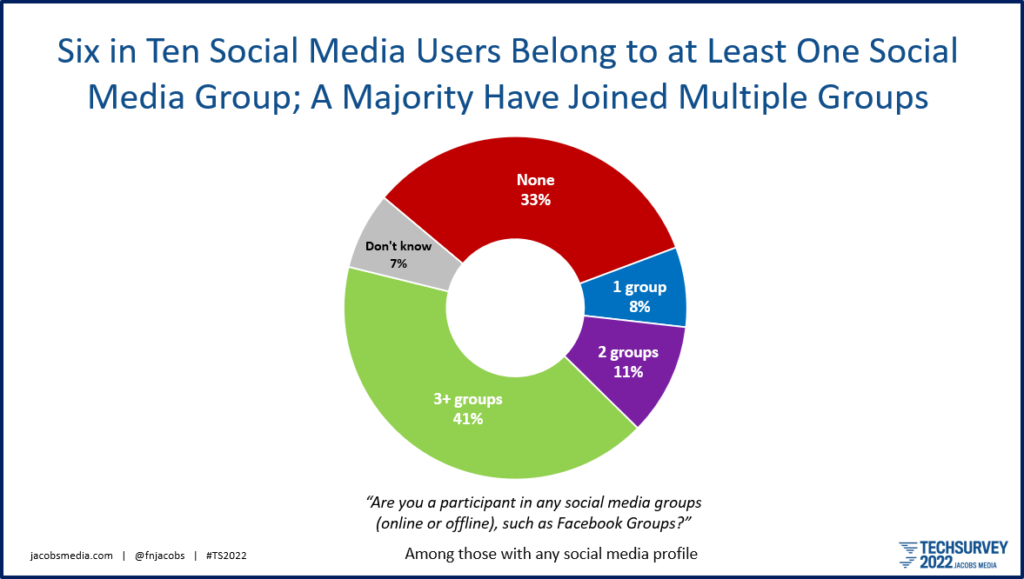
According to Washington Post reporter Amanda Coletta, the group – “Miramichi Mystery Machine” – has reached well more than 5,700 members, about one-third the size of the entire town. And that’s where the clues and stories were sourced, helping locals piece together the location of the $100 bills.
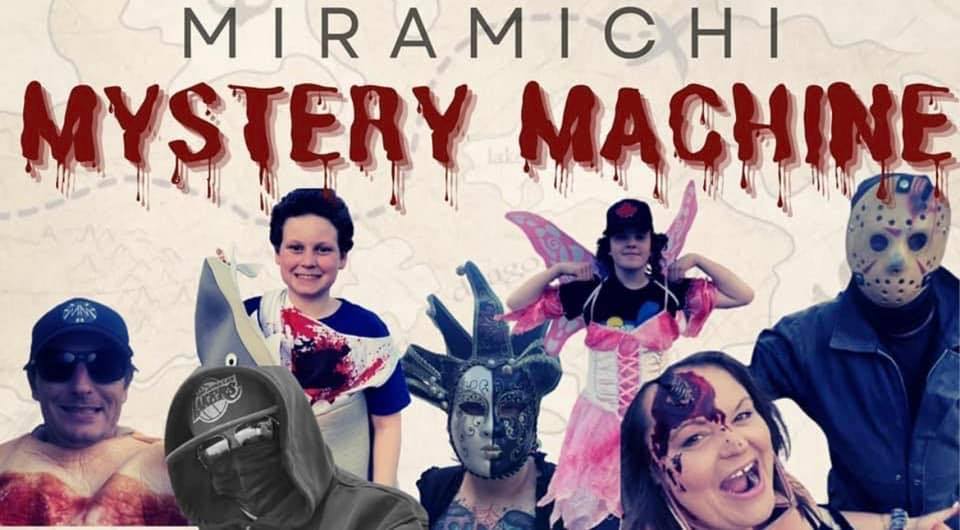
The staid, credible CBC News team has also been swept up in the hype. As the giveaway wound down, the news team covered the goings-on in Miramichi. And as residents uncovered the locations of the cash, participation amped up, captivating the town – and other news media outlets. Of course, that’s another goal of a great contest – generating what we now called “earned media.”
To this day, no one seems to know the identity of the mystery philanthropist, seemingly giving away cold hard cash in a town hard hit by the COVID pandemic. As many commenters in these news stories point out, the source of the cash may be unknown. But the intriguing event clearly helped local retailers in Miramichi where business has not been booming.
As the owner of the Three Dog Distillery and bar, The Dirty Dog, Cheryl Browne, explained to the CBC, “I mean, certainly, whoever’s behind this is doing a fair amount of promotion for local businesses, which is good. It’s still a bit creepy.”
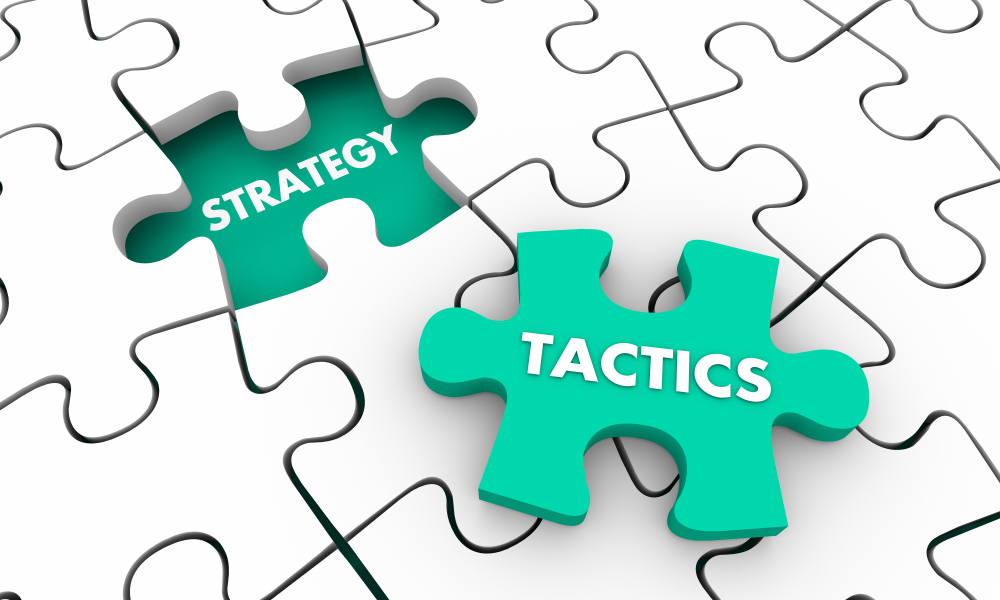 So, you can believe that radio contests occupy the cellar of promotions or even motivations behind why people listen to the radio. Or you can take a step back, and think about a “tactegic” contest where the prize + mystery + production + marketing (on and off-air) can make for not just a great giveaway, but can create fervor, excitement, and attention. I’m thinking most stations could use a combination of those key ingredients that leads to attention, sampling, and habitual listening. Thanks to the power, reach, and influence of social media, impact can run even higher.
So, you can believe that radio contests occupy the cellar of promotions or even motivations behind why people listen to the radio. Or you can take a step back, and think about a “tactegic” contest where the prize + mystery + production + marketing (on and off-air) can make for not just a great giveaway, but can create fervor, excitement, and attention. I’m thinking most stations could use a combination of those key ingredients that leads to attention, sampling, and habitual listening. Thanks to the power, reach, and influence of social media, impact can run even higher.
After all, if it can turn on a small, sleepy Canadian town, imagine what it could do it your city.
Like everything we put on out on the airwaves in radio, time and attention spent on content – in this case, a contest – is never wasted if it checks off all the above-mentioned boxes.
Or maybe a black box.
Postscript: JacoBLOG reader Gary Kline cites a Wikipedia entry suggesting “choke lines” or “choke exchanges” – the ability to handle large volumes of calwere created as a result of “The Last Contest” presented by Y100 in Miami. Here’s the quote:
“One of the early choke lines (exchanges) was instituted due to a widely advertised contest by a local radio station in the Miami/Fort Lauderdale area. WHYI-FM advertised their “Last Contest”. The top prize was an automobile. Since the advertising lasted over a month, there were a very large volume of calls when they announced for people to call in. There were so many calls that the local exchanges ran out of dial tones. This caused major issues since at the time if a caller had no dial tone, the caller could not dial at all. After it was over, the area emergency services filed complaints, and were heard. Shortly afterward the 305-550 exchange came into being. The first number on it was 305-550-9100 (for Y100 radio station). Due to the issues involved because of the “Last Contest”, this may have been what caused the creation of the choke exchanges.”
- Media And Technology In 2025: Believe It Or Not! - April 18, 2025
- In Radio, You Just Never Know - April 17, 2025
- The Secret To Making A Great Podcast (And Great Radio) - April 16, 2025




Fred you’re not gonna send me an invoice for these mentions in your always interesting blog postings are you? YES, I’m pretty sure that I have The Last Contest by Jack McCoy somewhere in my archives from when it ran on the legendary 1170/KCBQ in San Diego! If I ever am able to get you to come over to my house in Novi, you will understand very quickly WHY itr’s not always easy to find things. Love you man!
Art, one day when you least expect it, I’ll be standing at your front door wondering where the heck is that “Last Contest” production.
As I guy who grew up on that legendary station–the station that’s the reason I enjoyed a wonderful career in the industry–I hope I can be standing right beside you looking for that Last Contest production, Fred!
Party at Art Vuolo’s house!!
Contests, games, whatever they are are still big things -or can be if they’re “played right”. Back in the early 80s, one station put black box on top of the Coliseum in Cincinnati. Early on, one caller to the station announced that he KNEW what was in the black box, it was HIM. HE was a morning host on a competing station, and he wanted his prize. Well of course he couldn’t get it because the rules forbade a winner from a competing media company. Another time, same place a station vowed to give away a $500,000 prize, another company coughed up a million! Radio was competitive then, exciting and full of fun! Thanks for the reminders.
You’re welcome. Radio is in a different place than it was back then. But looking at the Miramichi situation, if it can happen there, it can happen anywhere.
You know as your resident “Prize Pig” I just have to chime in on this one, Fred! The thing that stood out on the KS95 spot was when they said, “Local winners, guaranteed!” Contests must be local for me to care. If I don’t win, I want to know one of my neighbors won. (Sorry but “nationwide texting” contests just don’t get me excited—at all.) Contests also have to be fun and interesting to listen to whether or not you’re participating. Most people will never appear on a game show, but they still watch them, not because they’ll win anything but because it’s fun to watch others have fun and win prizes—and play along! (I’m looking at you, “Name the Montage of Songs to Win a Cool Grand.”) As for coming in last on the “Why AM/FM?” chart, granted, contests may not be the strongest drivers to stations. But as long as the contests aren’t driving AWAY listeners, I’d call 11 percent a very healthy amount of people worth going after.
Finally, I just have to close with the most brilliant radio contest you’ve probably never heard of, Fred, and if I’m not mistaken, was also the brainchild of the “legendary Jack McCoy.” When KCBQ was having technical difficulties, going on and off regularly during its heyday of dominating San Diego’s airwaves, what did it do? Put some sheepish “We’re sorry for the inconvenience, we’re currently experiencing technical difficulties” apology on the air? NO! They turned it into a contest! They ran spots saying anytime they go off the air, the first person to call in when they came back on won $100!! For pocket change, KCBQ had higher ratings while OFF the air than most of their competitors had while ON the air! THAT’S how you run a radio station. THAT’S how you own your city! THAT’S what the likes of Mr. McCoy can do for a station–and all with just a little bit of “pocket change.”
I never met McCoy, but it’s hard not to imagine he was one of the more creative programming minds in radio. And he wasn’t alone. There were many who thought the way he did – always looking for that bigger than life promotion, contest, event, benefit. Thank you, David.